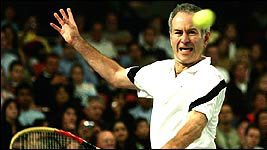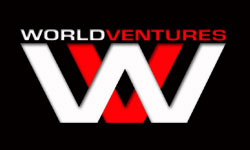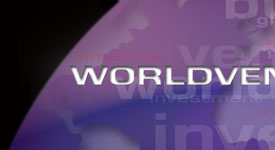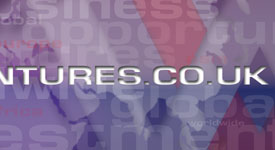Worldventures.co.uk
: the sport telegraph reviews



Return to : Top
MCENROE MAGIC TOO MUCH FOR MURRAY
By Mark Hodgkinson
4th October 2004.
Wembley Arena was transformed into a giant pre-club
bar last night, Andrew Murray, just 17, walking out on court with
a blonde on each arm, the sweep of the searchlights, and the thump-thump
of the DJs in his ear. If that was an exhilarating entrance for
the British junior, so was the experience that followed.

Mac attack: Battling John McEnroe wins his Superset match in typical
style.
This new twist on the sport, Superset Tennis,
had allowed the teenager some court-time with John McEnroe. Murray
did not seem to care that he was outplayed, that he lasted just
24 minutes, and had only managed to come to net when he was shaking
hands at the close of his 6-1 defeat. This was a tennis lesson,
in all senses. "John told me at the net that I have a great
future in the game. I told John that it was a great honour to
be on the same court as him," said Murray, who has shot to
prominence after winning the junior version of the US Open last
month. That new celebrity gave him a shot at this one-set, eight-man
competition, with the overall winner banking a cheque for £250,000.
McEnroe may have salt-and-pepper hair, may have
arrived on site looking distinctly jet-lagged after flying in
from New York, and may be 45 but he has retained his competitive
urges. McEnroe is keen to help Murray with his career, and spoke
to him afterwards, but this was totally ruthless. The match, the
most eagerly anticipated of the four in the afternoon session,
was over surprisingly quickly. It demonstrated two things. First
that McEnroe still has what it takes; second that Murray would
possibly have been out of his depth if he played in the Davis
Cup the weekend before against Austria. McEnroe had suggested
that. Murray has class, but his public need to be patient.
It was the teenager rather than the old showman
who fired up the crowd first, pumping his fist wildly after swiping
a forehand inside the line. The rules encouraged players to query
line calls, with disputes sorted out quickly using Hawk-Eye on
the giant plasma screens, but again it was Murray who was there
first. He knew he had to get in quick, questioning a serve on
the first point.
McEnroe quickly followed, raging at a line call
on the second point. Hawk-Eye showed that the umpire was right,
McEnroe wrong. The New Yorker did not like that. "That's
not even accurate," he spat at the plasma screen. He explained
his mini-tantrum to the cheap seats: "It's in my contract,
all right." But McEnroe, who was returning serve with a lot
of bite, broke in the second game with a backhand volley and again
two games later when Murray came over a forehand and hit it into
the tape. Murray had his only break point in the seventh game,
but McEnroe held on to serve out the match.

Rusedski interviewed courtside after beating Becker.
This format was meant to herald short and snappy
matches, but that idea seemed to be totally lost on Greg Rusedski
and Boris Becker. By the close, they were more than well acquainted
with each other. With a tie-break not played until 10-all, the
quarter-final extended to a 10-11 victory for the Briton. Rusedski
came very close to embarrassment, defending four match points
against a 36-year-old opponent whose midriff has thickened with
five years of retirement. "That was the longest set I've
ever played," Becker huffed. "But the match points showed
that I can still live with the top players." In the end,
there was only Paul McKenna between the two players. The players
were allowed to talk to their coaches during the changeovers,
but without anyone in his employment, Rusedski had invited the
celebrity hypnotist alongside.
Should Jeremy Bates, the Davis Cup captain, be
concerned? "I don't know if Jeremy's job is under threat,"
Rusedski said. "Paul is a good mate of mine." It was
still unclear how much McKenna actually knows about topspin backhands
and stop volleys, but the ploy seemed to work, with Becker playing
a horrid tie-break. "Paul stared into Boris's eyes. All the
guys were scared of looking at Paul in case they got hypnotised,"
said Rusedski, who now plays in an Alice-band. "I explained
to him that I didn't have a coach at the moment and asked him
whether he wanted to come on court with me. Paul could see that
I was getting very tight out there, and was helping me with a
few relaxation techniques. I've done some work with him in the
past, helping me to get over injuries. It's all about the power
of the subconscious." There was also a serious element to
last night. All eight players argued that some of the technological
innovations used here should be on the main tour. "They show
where the ball lands and there is no argument. I would be in favour
of it on the main tour," Rusedski said.
A cautionary note was added by Goran Ivanisevic,
who was playing his first tennis since retirement at Wimbledon.
He lost 6-4 to Tommy Robredo, a Spaniard named after the rock
opera by The Who and so at home in this kind of environment. "This
is good all this craziness," the Croatian said, "but
maybe there is a little too much craziness."
Return to : the
wembley page


Return to : Top
LATE SHOW UPSETS SUPERSET
FORMAT
By Mark Hodgkinson
5th October 2004.
It was far too late on Sunday, close to midnight,
when Mario Ancic did the usual tennis player celebration, dropping
to his knees and leaning so far back that you worry about snapping
bones. 'Super Mario' was happy - his was a cheque for £250,000
- but several aspects of Superset Tennis need improving.

This is not to say that the exhibition event,
a new, offbeat format at Wembley Arena, did not put on a good
first show in this country. It did, but there was still the sense
that it did not go far enough in two key areas. That was almost
inevitable, as although there had been a pilot in the United States,
this was done on a far grander scale.
The first talking point is that Superset was
marketed as short and snappy, but wasn't. Not quite. The evening
session overran by over an hour, dragging the coverage out of
prime time as Ancic and Greg Rusedski extended the final of this
one-day, one-set event to 11-9.
The tie-break needs to be at a television-friendly
six-all, as normal, not 10-all. Especially if the event is all
about its denouement, offering the dramatic tension of a winner-takes-all
prize. The organisers may have been led by what happened in America,
where the matches were brief, but this needs to be changed.
The second talking point was the promise of 'wackiness'.
It could have been so much wackier. The music-and-lights entrances
were great value, especially John McEnroe hamming it up like a
prize-fighter, but much of the pre-match extravaganza can be seen
across Europe during the sport's indoor season. Something more
than HawkEye is needed.
Return to : the
wembley page
|













